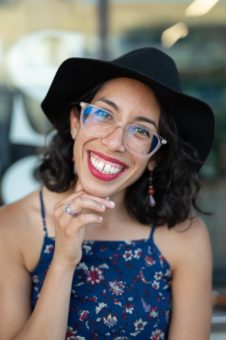Updated on 07/13/23
What does recovery mean to me? To answer that question, I think it’s important to explore what I thought recovery meant at the beginning of my journey, when I was standing at the base of what seemed to be an insurmountable mountain, a journey I felt completely ill prepared for. I wanted recovery to be something unrealistic: perfectly smooth, organized, linear, with moments of clarity, a lovely short montage in the story of my life with a great soundtrack playing in the background. I had no one to tell me the truth of recovery: it is work. That it is a daily commitment despite the challenges that you don’t even think about before embarking on this journey, such as learning to live in a triggering world that places so much value on appearances above mental health. Any time I had a stumble in my recovery journey, whenever the eating disorder voice would yell at me for completing a meal, or when I engaged in exercise in secret, I felt like I had failed yet again. Recovery was not the shiny version of me becoming a vibrant butterfly after a life struggling as an ugly caterpillar. Was it one of the best things I could ever do for my mental, emotional and physical health? Absolutely, and recovery was not about appearing to know exactly what I was doing every single moment like I thought.
I spent the beginning of my adult life with a bully in the form of an eating disorder influencing what I thought about myself and what I deserved. During those years I lived with my eating disorder controlling my life, I didn’t tell loved ones about how disordered thoughts about food and my body image claimed the majority of my brain space. Nearly every waking moment was spent thinking about what food rules to follow, how I was going to squeeze in exercise that I desperately should not have been engaging in or looking up menus for restaurants so that I could order the lowest calorie option even when I pined for the tastier yet higher calorie options. I would go to sleep and wish I could just wake up and be recovered; be the new me without all the heartbreak, confusion and frustration. I didn’t know who I was without the eating disorder. When talking to my friends and peers, I could only think about how boring I must be, how they must be judging my changing body. I didn’t know what I liked or didn’t like. Did I like to exercise? Did I really like baby carrots and celery? What opinions did I even have about anything? Now I realize that in shedding parts of the eating disorder, I was making space for new thoughts that had nothing to do with food or body. The space left behind was brimming with possibility, but it was also highly uncomfortable. I gave myself permission to try new things: paintball, pottery, writing stories, joining book clubs and traveling to different countries. I learned that I love the chaotic energy of travel and the quiet stillness of watching the sunset. I learned to enjoy my company and be a good friend to others, as well as myself.
After many, many slip ups and slowly paving a new path free of disordered behavior, I am grateful to have had the experience of recovery. Recovery is messy and beautiful. It is crying over the metamorphosis of body and mind. It is facing fears, every day, multiple times a day. It is growing resilient. It is going from days, weeks, maybe even months without appetite and one day getting the gnawing feeling of hunger from deep within and honoring that hunger with nourishing, satisfying food. It is going to seconds of a food and eating a cupcake when offered to me, even if I wasn’t planning for it. Recovery is trying on different coping skills to see what works best. It is learning to give yourself grace. It is being about to say to yourself, “This is hard and you can do hard things.” It is going for a run for the thrill of feeling the power of my healthy body and taking rest days without guilt. Recovery is learning that nourishment is necessary, no matter what. What does recovery mean to me? Recovery means living my true, authentic life and remembering I am worth love and care, regardless of what I look like. Recovery is choosing myself, day after day, because I am worth it.
If you or someone you know is struggling with an eating disorder, Center for Discovery is here to help.
Elizabeth Moscoso is a writer, graduate student and counselor who has experience working with adults and adolescents in eating disorder treatment resident and outpatient settings. She is passionate about breaking down shame and stereotypes around eating disorders and sharing her lived experience to help others with their own journey to finding peace with food and body. In her free time, she enjoys spending time exploring different parts of the Washington, D.C., metropolitan area, taking photos and finding new coffee shops. You can see snapshots on Instagram (@hazelbite90) of Elizabeth living her recovered life!
